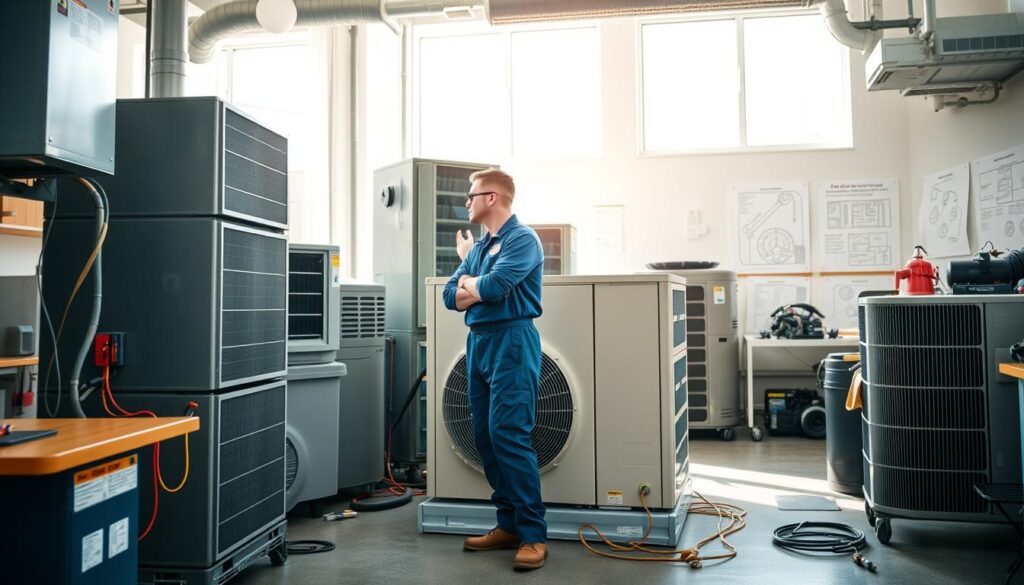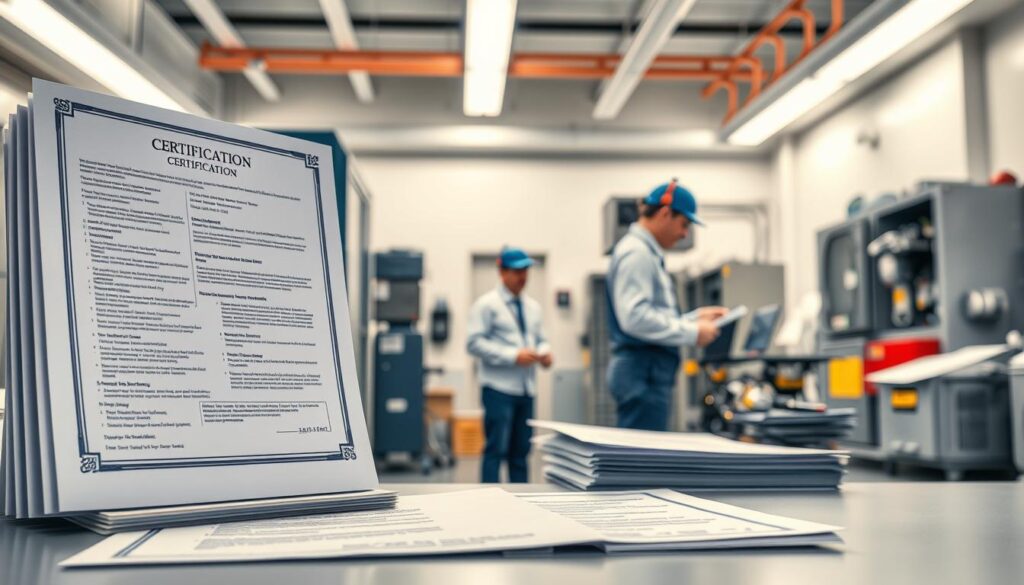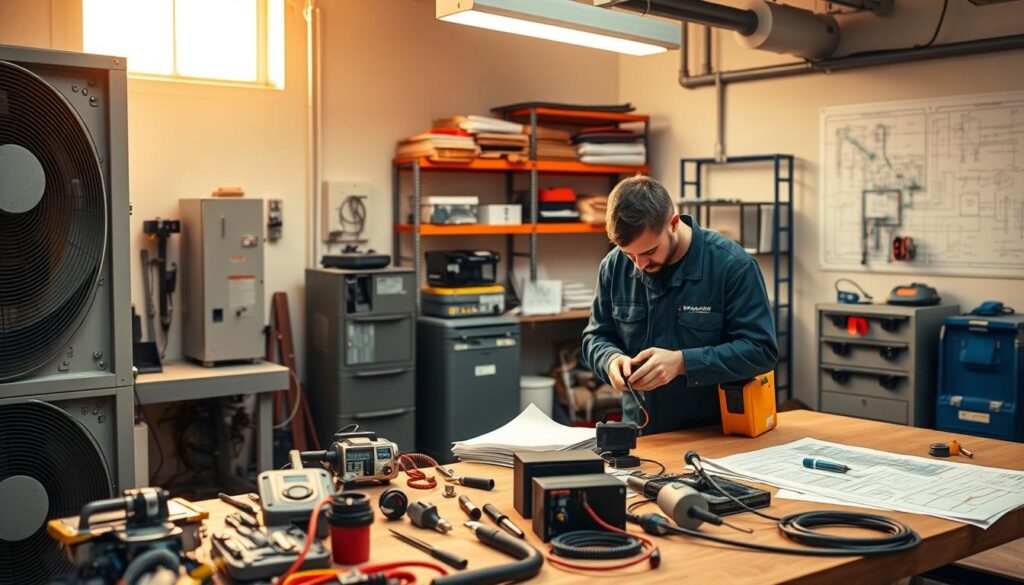How Long Does It Take to Become an HVAC Technician? Are you thinking about switching to a rewarding HVAC career? Wondering how long it takes to become an HVAC tech? The path to becoming an HVAC pro is flexible and exciting.

The HVAC field has many ways to start, with training times from 6 months to 5 years. The US Bureau of Labor Statistics says HVAC tech jobs will grow 5% from 2021 to 2031. This makes it a great choice for job stability and growth.
Knowing how long HVAC training takes is key if you’re thinking about this career. Your time frame depends on your education choice. You can go from vocational schools to apprenticeships.
Key Takeaways
- HVAC technician training can take 6 months to 5 years
- Multiple educational paths are available for aspiring technicians
- Vocational schools offer faster training options
- Apprenticeships provide hands-on experience
- Career opportunities are growing in the HVAC industry
Table of Contents
Overview of HVAC Career Paths and Training Options
Exploring an HVAC career path offers exciting opportunities for those interested in technical skills and hands-on work. The HVAC job training landscape provides multiple routes for aspiring technicians to build successful careers in this dynamic industry.
The HVAC industry presents diverse entry points for professionals with varying levels of experience and educational backgrounds. Whether you’re a recent high school graduate or looking to switch careers, you’ll find multiple pathways to success.
Traditional Education Routes
Traditional HVAC career paths typically involve structured educational programs that provide thorough training:
- Vocational school programs (9-12 months)
- Community college associate degree programs (2 years)
- Technical institute certifications
Alternative Training Paths
Not everyone follows a traditional educational route in HVAC job training. Alternative options include:
- Apprenticeship programs
- On-the-job training
- Military technical training
- Online certification courses
Career Entry Points
HVAC professionals can enter the field at various levels, depending on their training and experience:
- Entry-level positions: HVAC apprentice, helper, maintenance technician
- Mid-level roles: Residential and commercial service technicians
- Advanced positions: HVAC contractors, instructors, design engineers
With a median annual wage of $57,300 and a projected 9% employment growth, the HVAC industry offers promising career opportunities for those willing to invest in their skills and training.
Explore Our HVAC Shop
Looking for top-rated HVAC tools, parts, and accessories? Visit our shop and find the perfect solution for your needs.
Visit the ShopHow Long Does It Take to Become an HVAC Technician?
Becoming an HVAC technician needs a good plan for training and education. The time it takes can change a lot based on your path. Most programs last from 6 months to 3 years, giving you many ways to start your career.
When looking into becoming an HVAC pro, you’ll find several main training paths:
- Certificate Programs: Usually the quickest, lasting 7-12 months
- Community College Programs: Typically 2-4 years long
- Apprenticeship Programs: Can last 2-5 years
At schools like Apex Technical School, students do about 900 hours of training. This includes both classroom learning and hands-on practice. These detailed programs get you ready for entry-level jobs in the HVAC field.
Your exact time frame depends on a few things:
- The program you choose
- Your own learning speed
- Any technical experience you already have
- State licensing rules
The Bureau of Labor Statistics says HVAC technician jobs will grow by 5% from 2020 to 2030. This makes it a great time to begin your training.
Explore Our HVAC Shop
Looking for top-rated HVAC tools, parts, and accessories? Visit our shop and find the perfect solution for your needs.
Visit the ShopTypes of HVAC Educational Programs
Choosing the right HVAC education program is key to a successful career. There are different paths to becoming a skilled technician. Each path has its own timeline and benefits.
When looking at hvac vocational schools, you’ll find three main paths. These paths can help you start your HVAC career:
Certificate Programs: Quick Entry into the Field
Certificate programs are the quickest way to start working in HVAC. They last 6-12 months and focus on practical skills. The benefits include:
- Shorter time commitment
- Lower overall cost
- Hands-on technical training
- Rapid entry into the workforce
Associate Degree Programs: More in-Depth Training
Community colleges offer two-year associate degree programs. These programs give a deeper education. They mix technical skills with broader knowledge.
| Program Feature | Details |
|---|---|
| Duration | 18-24 months |
| Typical Courses | Electrical systems, refrigeration, heating technologies |
| Additional Benefits | General education credits, possible further education |
Apprenticeship Programs: Earn While You Learn
Apprenticeships combine classroom learning with on-the-job training. They usually last 3-5 years. You get to learn a lot while earning a salary.
- Supervised by experienced professionals
- Structured learning environment
- Opportunity to apply skills immediately
- Potential for higher starting wages
Each HVAC educational path has its own benefits. Your choice depends on your career goals, time, and money.
HVAC Certification Timeline and Requirements

Understanding the HVAC certification timeline can be tricky. But knowing the key requirements can help you start your career smoothly. Each certification has its own path and timeline, affecting your career journey.
The most common HVAC certification paths include:
- EPA 608 Certification: Typically takes 1-2 weeks to complete
- NATE Certification: Requires 3-6 months of preparation and exam completion
- Manufacturer-Specific Certifications: Usually last 1-3 months
- State or Local Licensing: Can take between 6 months to 2 years
Your HVAC certification timeline depends on several important factors. Most states require at least 12 months of field experience before you can take certification exams. The licensing requirements vary greatly by state, so it’s key to check local rules.
Key considerations for HVAC certification include:
- Completing required training programs
- Gaining practical work experience
- Passing written certification exams
- Meeting state-specific licensing requirements
Interestingly, states like New York, Indiana, and Colorado have different licensing rules. Some need a lot of testing, while others are more flexible. Getting certified can boost your salary and career growth.
Pro Tip: Always verify the specific certification requirements in your state to ensure you’re on the right path.
Explore Our HVAC Shop
Looking for top-rated HVAC tools, parts, and accessories? Visit our shop and find the perfect solution for your needs.
Visit the ShopBenefits of Vocational School Training
Choosing hvac vocational schools can change your career path in the HVAC industry. These programs offer special benefits that get you ready for success in hvac job training and more.
Vocational schools give you a deep dive into HVAC education. They go beyond just learning. You get hands-on training that starts your career fast.
Hands-on Learning Experience
Your training will focus on skills that employers want most. Key benefits include:
- Direct interaction with real HVAC equipment
- Simulated workplace scenarios
- Practical troubleshooting techniques
- Safety protocol implementation
Industry-Experienced Instructors
The instructors at hvac vocational schools bring real-world experience to class. They teach you:
- Current industry standards
- Advanced technical knowledge
- Professional best practices
- Insider career insights
Career Services Support
Most vocational schools offer strong career help. They assist you in moving from student to professional. This support includes:
- Resume building workshops
- Job placement assistance
- Interview preparation
- Networking opportunities
With programs like UEI College’s HVAC training completing in just 10 months, you can quickly launch your career in this dynamic field.
Essential Skills and Knowledge Development

Getting the right skills is key for success in HVAC training. You’ll learn both technical and soft skills needed in the HVAC world. The best technicians mix practical knowledge with great problem-solving skills.
During HVAC training, you’ll learn important technical skills like:
- Understanding refrigeration cycles
- Electrical system diagnostics
- Heating and cooling system repair
- Safety protocol implementation
- Advanced troubleshooting techniques
The training covers essential areas to get ready for real-world problems. Technical skills are just part of being a top HVAC technician.
“Success in HVAC isn’t just about knowing systems, it’s about understanding how those systems impact people’s comfort and safety.” – HVAC Industry Expert
Soft skills are also vital in HVAC training. You’ll work on:
- Customer communication
- Time management
- Critical thinking
- Teamwork capabilities
Certification shows the value of learning all skills. NATE (North American Technician Excellence) certification proves your technical and professional skills.
| Skill Category | Key Competencies | Training Focus |
|---|---|---|
| Technical Skills | System Diagnostics | Hands-on Technical Training |
| Safety Skills | EPA Regulations | Compliance and Protection |
| Professional Skills | Client Interaction | Communication Techniques |
Staying committed to learning will help you succeed in the HVAC field. See every training chance as a way to improve your skills and career.
Explore Our HVAC Shop
Looking for top-rated HVAC tools, parts, and accessories? Visit our shop and find the perfect solution for your needs.
Visit the ShopFactors Affecting Training Duration
Starting your HVAC technician journey is unique for everyone. Many things can change how long it takes to finish your training. Knowing these factors helps you plan your career better.
Several important things affect how fast you can finish your HVAC training and start working:
Prior Professional Experience
Having experience in related fields can make your training shorter. If you have:
- Mechanical skills
- Electrical knowledge
- Construction experience
You might learn faster and finish sooner.
Individual Learning Pace
How fast you learn is key. Some people pick up technical skills quickly. Others need more time to understand complex HVAC systems.
Program Selection
The type of program you choose also affects your training time. You can choose from:
- Certificate Programs: 6-12 months
- Associate Degree: 2 years
- Apprenticeship: 3-5 years
Each option has its own benefits. You can pick the one that fits your career goals and personal situation best.
Job Market Outlook and Growth
Your HVAC career path is looking bright with a 6% job growth rate nationwide. The industry currently has 415,800 technician jobs in the United States. It’s expected to have 37,700 job openings every year until 2032. This steady demand means great opportunities for those in HVAC job training.
HVAC professionals can expect competitive salaries. In May 2022, the median annual wage was $51,390. Top earners can make up to $82,630. Salaries vary by industry, from $49,630 in plumbing and heating to $57,760 in wholesale trade. As you gain experience, your salary will likely increase.
Some regions are growing faster than others. Texas is leading with a 21% job market expansion. New York and California are close behind with 20% and 14% growth, respectively. The average HVAC worker is 54 years old, creating more room for new technicians. With 80% of construction companies struggling to find workers, your skills will be highly sought after.
The global HVAC market is expected to hit $367.5 billion by 2030. Investing in certifications and continuous learning will help you secure a stable and rewarding career in this growing field.
FAQ
How long does it typically take to become an HVAC technician?
What are the different educational paths to become an HVAC technician?
Do I need certification to work as an HVAC technician?
What skills do I need to become a successful HVAC technician?
How much does HVAC training typically cost?
How long does it typically take to become an HVAC technician?
What are the different educational paths to become an HVAC technician?
Do I need certification to work as an HVAC technician?
What skills do I need to become a successful HVAC technician?
How much does HVAC training typically cost?
FAQ
How long does it typically take to become an HVAC technician?
The time it takes to become an HVAC technician varies. Certificate programs last 6-12 months. Associate degree programs take 2 years. Apprenticeships can last 3-5 years.
Your time frame depends on the program, your learning pace, and any experience you have.
What are the different educational paths to become an HVAC technician?
You can choose from several paths. You can get a certificate from a vocational school, an associate degree from a community college, or an apprenticeship. You can also get on-the-job training.
Each path has its own benefits, like quick certification or a full education.
Do I need certification to work as an HVAC technician?
Yes, most states require HVAC technicians to be certified. You need to complete a training program, pass an exam, and have work experience. The rules vary by state, so check your local laws.
What skills do I need to become a successful HVAC technician?
You need technical and soft skills. Technical skills include knowing electrical systems and refrigeration. Soft skills like problem-solving and customer service are also key.
Being able to communicate and having physical stamina are important too.
How much does HVAC training typically cost?
Costs vary a lot. Certificate programs cost between
FAQ
How long does it typically take to become an HVAC technician?
The time it takes to become an HVAC technician varies. Certificate programs last 6-12 months. Associate degree programs take 2 years. Apprenticeships can last 3-5 years.
Your time frame depends on the program, your learning pace, and any experience you have.
What are the different educational paths to become an HVAC technician?
You can choose from several paths. You can get a certificate from a vocational school, an associate degree from a community college, or an apprenticeship. You can also get on-the-job training.
Each path has its own benefits, like quick certification or a full education.
Do I need certification to work as an HVAC technician?
Yes, most states require HVAC technicians to be certified. You need to complete a training program, pass an exam, and have work experience. The rules vary by state, so check your local laws.
What skills do I need to become a successful HVAC technician?
You need technical and soft skills. Technical skills include knowing electrical systems and refrigeration. Soft skills like problem-solving and customer service are also key.
Being able to communicate and having physical stamina are important too.
How much does HVAC training typically cost?
Costs vary a lot. Certificate programs cost between $1,500 and $15,000. Associate degrees cost between $10,000 and $30,000. Apprenticeships might cost very little.
Many students get financial aid or scholarships to help pay for training.
What is the job outlook for HVAC technicians?
The job outlook for HVAC technicians is great. The Bureau of Labor Statistics says there will be a 15% growth from 2021 to 2031. This is much faster than average.
This growth is due to more construction, energy efficiency upgrades, and the need for new HVAC systems.
Can I become an HVAC technician with no prior experience?
Yes, many programs are for beginners. Starting with a certificate or an apprenticeship can give you the basics. Many employers also offer on-the-job training for new technicians.
What are the advantages of attending a vocational school for HVAC training?
Vocational schools offer hands-on training and experienced instructors. They also have access to specialized equipment and career services. These programs often have connections with local employers, helping you get certified faster.
,500 and ,000. Associate degrees cost between ,000 and ,000. Apprenticeships might cost very little.
Many students get financial aid or scholarships to help pay for training.
What is the job outlook for HVAC technicians?
The job outlook for HVAC technicians is great. The Bureau of Labor Statistics says there will be a 15% growth from 2021 to 2031. This is much faster than average.
This growth is due to more construction, energy efficiency upgrades, and the need for new HVAC systems.
Can I become an HVAC technician with no prior experience?
Yes, many programs are for beginners. Starting with a certificate or an apprenticeship can give you the basics. Many employers also offer on-the-job training for new technicians.
What are the advantages of attending a vocational school for HVAC training?
Vocational schools offer hands-on training and experienced instructors. They also have access to specialized equipment and career services. These programs often have connections with local employers, helping you get certified faster.

